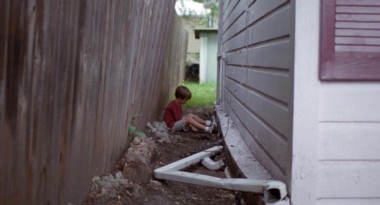It’s barely been 10 months since my wife and I brought our twins into the world, but when I look back at pictures from the first few weeks they were with us, I’m always shocked to see how much they’ve grown. It’s not just that they’ve changed—though they have, to be sure—but that they’ve morphed into different versions of themselves. Bigger, with bodies longer in some places and wider in others, but still recognizable, somehow, as those tiny creatures we brought home from the hospital.
It’s one of those biological mysteries that is often glossed over in movies, where it isn’t really feasible to have, say, child Tom Hanks and adult Tom Hanks play the same role. (See, for instance, Big, where David Moscow played the child version of Hanks’ character. And to really get a feel for time’s relentless march, consider this: Moscow will be 40 himself this year.) Really, the closest thing you could do as a filmmaker would be to shoot your movie over the course of a decade, using the same cast, all playing the same characters, all aging in real time. Except of course, that no one is quite crazy enough to do that.
Except, that is, Richard Linklater. The director’s new film (playing at Amherst Cinema) is called Boyhood, and it’s filmed over a 12-year period with the same cast. It takes on the story of one young man’s life from ages 6 to 18, following him as he transitions from boy to adolescent to young man. It’s a work of fiction—Mason, the boy at the heart of it all, is played by Ellar Coltrane, while his parents are played by Patricia Arquette and Linklater regular Ethan Hawke (Before Midnight)—but it’s a fiction that is reinforced by that ineffable undercurrent of reality provided by time. We’re used to seeing people age over time in out day to day lives, but to see it on film is a different experience, and one that strengthens the magic of storytelling.
The resulting story is about a childhood marked by family moves and broken marriages, first loves and heartbreaks, new schools and jobs—in short, it’s about growing up. Linklater built the story year to year with longtime collaborator Sandra Adair, shooting in three- or four-day annual fits, adjusting the screenplay to take into account the real-life struggles and emotions his lead actor was facing in any given year. It’s an audacious idea, and not one I’ve heard of before in drama; while the 7 Up documentary series has followed the same group of people for decades now, the simple fact that Linklater’s film is fiction adds a certain element of interest: will time prove to be the enemy, destroying the intense closeness bred of the compacted schedule of a standard film shoot? Or will it be the secret ingredient that imbues a familiar story with something beyond the familiar, something that will remind us, perhaps silently, of our own younger, changing, selves?
Also this week: Amherst brings in three special shows of note. First up are screenings of the Gene Hackman classic The French Connection (Saturday, 2pm; Tuesday, 7:30pm). William Friedkin’s 1971 police drama and car-chase benchmark shows as part of the theater’s Hit The Road, Jack! series of films, which is devoted to films about “classic cars, fast drivers, and asphalt odysseys.” Keep an eye open for Eddie Egan in a small role; he was the real-life inspiration for Hackman’s famous Popeye Doyle.
That film is overlapped by screenings of The Sound of Music (Sunday, 2 p.m.; Wednesday, 7:30 p.m.), based on another true story—but if you don’t know Robert Wise’s 1965 musical landmark, any synopsis will fall short of the mark. There are better musicals, but I’m not sure there are any that are more hopeful, and less cynical, than this.
Finally, the theater will also screen The Kid Stays in The Picture on Monday at 7:30 p.m. (the show is free to Amherst Cinema members as part of Hampshire College’s Creative Media Institute series). The story of Robert Evans—the man who stumbled into a Hollywood career but went on to greenlight movies like The Godfather and Rosemary’s Baby—is the sort of Hollywood biography that defies belief.
With a personality bigger than most of his projects, Evans eventually found himself living his own legend, finally spiraling into drug addiction and a career nosedive before he managed to pull off the rarest of Hollywood feats: the comeback. Director Brett Morgen will be at the theater in person to discuss his film.•
Jack Brown can be reached at cinemadope@gmail.com.



